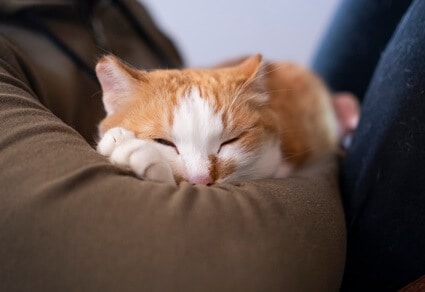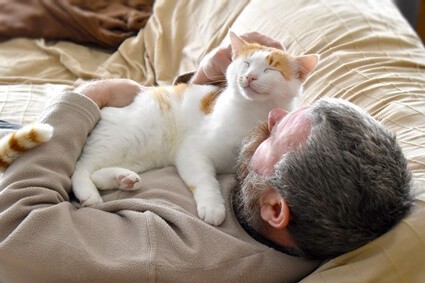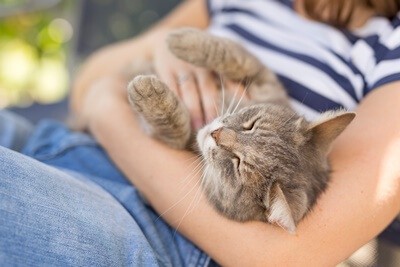Although many people associate the sound of purring with contentment, little is known about how cats purr, why cats purr, or if purring is a voluntary or involuntary action.
The truth is, cats can purr voluntarily and involuntarily. Cats don’t just purr when they’re happy—they also purr when they feel stressed, angry, or scared. In those moments, the purring is a reflex. Voluntary purring is used to communicate with humans, either expressing joy or demanding food.
Cats can purr loudly, softly, and in low or high pitches. Different types of purring indicate different types of moods. So, understanding what the different types of purring mean is a valuable skill that will enable you to better understand your cat.
Is Cat Purring Voluntary or Involuntary?
Cats use different forms of vocalization to communicate with us. Purring is one such form of vocalization, and it’s often used voluntarily by cats to ask for food or attention.
Purring is one of the first forms of vocalizations kittens learn as they purr to let their mother know they’re hungry. Though instinctual and completely involuntary at first, they eventually learn to use it voluntarily on their mother and humans when they’re older.
With that said, purring can also be involuntary. Cats are more expressive than people realize, and their bodies react differently when they’re feeling extreme emotions, such as joy, frustration, or fear. Involuntary vocalization is just one of many ways that cats react to certain situations, whether they’re positive or negative experiences.
When Does a Cat Purr Voluntarily?
According to Current Biology, cats purr voluntarily when asking for food.
Purring when soliciting food sounds different from the involuntary purring that cats make when relaxed. As the study notes, voluntary purring is low-pitched and sounds more urgent.
Experts suggest that cats use this kind of purring to exploit the fact that humans are sensitive to certain cries that ignite a need to nurture another living creature.
Solicitation purrs imitate the acoustic cues a crying baby makes. It’s the kind of sound that’s difficult to ignore, which is exactly what cats want when begging for food. It’s a tactic that’s sneaky and manipulative of them, but you can’t deny that it’s clever.
Kittens begin purring when they’re just a few days old, as they need a way to inform their mother that they’re hungry. It’s said that kittens that are properly socialized and are allowed to be reared by their mother grow up to use purring voluntarily on humans.
Cats that are separated from their mothers too early may not learn to associate purring with food acquisition. Instead, they use other vocalizations to solicit food from their owners.
When Does a Cat Purr Involuntarily?
Cats purr involuntarily when they’re experiencing intense emotions.
Just like the flattening of their ears, hissing, or dilated pupils, purring can be an involuntary response to a situation the cat is experiencing.
The emotions associated with purring can be either negative or positive, such as:
Contentment
Purring is most commonly associated with happiness. When a cat is happy, relaxed, and content, it’ll purr involuntarily as a response to feeling satisfaction.
It’s easy to tell when a cat is purring out of happiness. The purring is usually accompanied by other signs of contentment, such as slow blinking and head-butting.
Fear
Purring out of fear is why it’s important to understand the different types of purring cats can produce since you don’t want to continue doing whatever is scaring your cat.
When a cat is scared, the purring will be low in pitch. It may also sound a bit like growling if you listen closely enough. Fear-purring will be paired with other signs of defensive body language, such as a tucked-in tail, dilated pupils, and flat ears.

Stress and Frustration
Constant purring is associated with stress and frustration in cats. Purring while afraid or happy is temporary, and when the source of their reaction is removed, the purring goes away. However, if your cat is constantly purring for seemingly no reason, it’s because it’s upset.
Purring out of stress and frustration is a purr that many owners don’t pick up on. It’s often subtle, and there’s nothing obviously wrong with the cat at first. Any odd behavior might be dismissed at first, so pay close attention when your cat is purring excessively.
Cats will purr when stressed because they use purring to self-soothe. It’s completely instinctual, in the same way that people may run a hand through their hair when stressed to self-soothe. Purring reminds them of being with their mother since mother cats will often purr for their kittens to relax them.
Do Cats Purr When They Are Sick?
According to The Journal of the Acoustical Society of America, cats purr when they’re sick because they use it as a healing mechanism.
It has been proven that cat purrs are capable of:
- Treating bone fractures
- Aiding in muscle growth
- Healing wounds
- Lessen pain
It isn’t known if cats do this voluntarily or involuntarily. On one hand, it’s possible that cats automatically purr when they feel sick in the same way that they lose their appetite to conserve their energy and focus on healing. It is an unconscious action that helps them survive.
On the other hand, it doesn’t explain why cats will purr next to their sick owners. It’s no secret that cats are highly attuned to their owner’s emotional needs. They’re smart creatures that can tell when humans feel under the weather.
When an owner is injured or sick, the cat will often snuggle up next to them and begin purring for an extended period of time. Even otherwise standoffish cats will engage in this behavior, surprising the owners with such a sudden display of affection.
Could it be that cats know the healing, soothing effect their purrs have? Studies haven’t touched on whether they do or not, so it remains a mystery.
How Do Cats Purr?
According to the Journal of Zoology, cats purr by using their laryngeal muscles, breathing, and diaphragm. As they inhale and exhale, cats activate their laryngeal muscles so that there’s a glottal stop. When the muscles open up again, sound is produced.
The same thing happens to the diaphragm when cats inhale. However, while the larynx is what produces the sound and vibration associated with purring, the diaphragm is only in charge of controlling the airflow.
The muscle bursts in the larynx and diaphragm don’t occur simultaneously, so humans can’t purr like cats can. Our muscles aren’t capable of opening and closing off in such a way to produce rapid-fire vibrations while also allowing us to keep our breathing steady.

Why Do Cats Purr When Sleeping?
When people hear a cat purring in its sleep, it is automatically assumed that it’s because the cat is having a good dream. While this is true, cats also purr when they have nightmares.
Cats involuntarily purr when they’re both upset and happy. So, the reason your cat purrs while asleep largely depends on the kind of dream it’s having.
Cats will also purr in their sleep to self-heal. Sleeping is vital for all animals because it’s when the brain and body can repair themselves after a long day of being active. Cats purr while asleep to aid this recovery process.
Why Do Cats Purr Loudly When You Stroke Them?
Cats love being petted by their owners, and purring is one of the many ways they express that.
Cats can be very affectionate when they want to be, and research has shown that they love spending time with their owners. Stroking is a prominent way to bond with a cat—evident by how much it purrs when you do that.
If you’re concerned by how loudly your cat purrs when stroked, don’t be. If you were hurting your cat, it would let you know immediately by running away from you, hissing, or biting.
All cats are different, and they have different ways of purring. Some purr loudly, and others are a lot quieter. Either way, how loudly a cat purrs isn’t indicative of how much it’s enjoying the petting session.
Why Do Cats Purr When They Are Dying?
You may have heard it from vets or people who’ve had to put a beloved cat to sleep: cats often purr when dying. While many believe that this is because cats are at peace, this isn’t always the case.
Cats don’t just purr when they’re relaxed, they do it when they’re feeling scared and ill as well. Although it might be painful to think about, if a cat is purring while it is dying, it’s most likely because it’s experiencing discomfort and is confused about being at the vet.
It’s difficult to know just what a cat is feeling when dying since it’s not its usual self in that state. The purring could be because it’s medicated, relaxed, and pain-free or because it senses something is wrong. The best thing you can do for your cat (and yourself) is accompany it.
Cats can control their purrs, but there are also times when it’s involuntary. This depends on how your cat is feeling and the surrounding situation.

